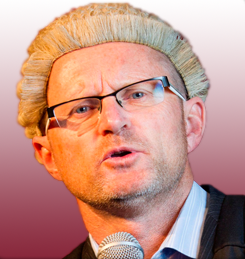Law and comedy aren’t terms that normally flow together, but Mediaworks legal counsel, commercial, James Elliott, has managed to fit the two together in a rather unique position.
Elliott, who’s worked for the media company since 2012, started out splitting his time between looking after contracts for shows and writing gags for the likes of news parody program
Seven Days.
However, since the company’s highly-publicised receivership last year, he’s transitioned into a full-time legal role – though he still performs stand-up comedy and MC’s for the likes of CLANZ’ annual conference on a regular basis.
"All I did was go and do a beginners night at the Classic Comedy & Bar, which is still in town and I still perform there. I just did that as a sort of emotional bungee jump sort of thing. It’s terrifying but, as I learned afterwards, it’s equally terrifying for the friends who come along to support you because, as you can imagine, everyone’s nervous that it’s going to be dreadful!
“I do observational comedy…With both lawyers and comedians, there’s that language foundation. I do quite a lot of wordplay and you have to have an awareness of yourself, who you are and what you observe around you. I also tend to be a bit older than a lot of the guys [doing stand-up], so I make a lot of observations around that.”
This isn’t Elliott’s first time standing as a token older person in crowd either. After a series of career changes following his postgraduate legal studies at Cambridge University in the UK, including a stint in the litigation team at
Russell McVeagh and several years working in PR and comedy, Elliott took on a junior position in
Bell Gully’s corporate commercial team.

“I’d sort of hit a ceiling in terms of what I could achieve in comedy and had a young family and financial responsibilities. I joined Bell Gully as the oldest ‘junior’ person in their corporate team. At that time, going back into that legal practice, I had in mind that long-term [goal] of being in-house counsel. I felt comfortable that I had the litigation experience under my belt and I thought that if I could add corporate and commercial knowledge and experience to that, then that would be good background towards being in-house counsel. I enjoyed [my time] at Bell Gully. With no corporate/commercial experience, I was very lucky to have a wonderful mentor in David Flacks, whose team I joined.”
After working at Bell Gully for a number of years, Elliott moved into a role as in-house counsel at APN, which he admits was a challenging position in terms of workflow.
“That was a team of four, three of whom were based in Australia. So I was sole counsel looking after the New Zealand business. It was quite a pressured role, so when I left that role I decided I wanted to go and do some different stuff again.”
Elliott went back into comedy writing and MCing corporate events, which inadvertently led to his current position after he ran into Mediaworks’ legal counsel and company secretary, Clare Bradley, at a CLANZ conference.
“I could empathise with her role as the sole legal counsel at a media company. In media, you’re hit with different challenges all the time – no two days are the same. Something will arise out of the news - or your intended news coverage – and will throw things at you because something’s going to court or threatening to, or whatever. It’s just so dynamic that you have a regular corporate commercial workflow, plus unexpected stuff.”
While some in-house roles can be quite specialised, Elliott says working for a broadcasting company like Mediaworks makes for a broad set of legal responsibilities.
“When I was working at APN, essentially as a team of one, I was kind of looking after everything…that would be everything down to people who needed their residency papers solicited, as well as ‘cocktail party law’, advising people about their neighbour’s fences and so on. Both of my roles have been very broad and for me that’s borne out the strategy of bringing litigation to my work.”
However, the bulk of Elliott’s time is now spent sorting out contracts for shows and show sponsors.
“The role that I have is broadly described as commercial contracts, so I look after the contracts for the programs that we buy, the programs we make and sponsorship associated with programs as well. So, for example, a program like
The Block…requires licensing from the offshore rights holder, the local production company that actually make the show and then a variety of contracts with sponsors who feature in the show.”
He says contract issues have become more complex in recent years as well, with the internet having become so closely intertwined with traditional media avenues.
“In television and radio, the issues are very immediate…because things are published online as well. If [a story’s] already been broadcast or it’s already been published in print, then that’s sort of a fixed set of cards that you’re playing with. It’s happened and you deal with the consequences. But now, with the fact that everything’s got an afterlife online, that changes the liability issues you might be dealing with.”

